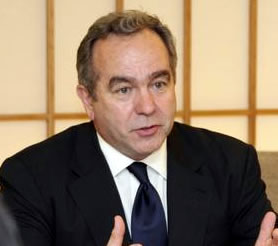 SEOUL, South Korea – North and South Korea are showing positive signs of improving relations, a U.S. diplomat said Thursday, but he cautioned that Pyongyang has yet to indicate it is serious about moving forward on denuclearization.The two Koreas agreed last week to hold their first reunions in a year for families divided by the Korean War, while South Korea is considering a proposal by North Korea to hold talks aimed at restarting a stalled joint tourism venture.Military tensions between the two sides remain high over the March sinking of a South Korean warship that Seoul and Washington blame on North Korea, which Pyongyang denies.
SEOUL, South Korea – North and South Korea are showing positive signs of improving relations, a U.S. diplomat said Thursday, but he cautioned that Pyongyang has yet to indicate it is serious about moving forward on denuclearization.The two Koreas agreed last week to hold their first reunions in a year for families divided by the Korean War, while South Korea is considering a proposal by North Korea to hold talks aimed at restarting a stalled joint tourism venture.Military tensions between the two sides remain high over the March sinking of a South Korean warship that Seoul and Washington blame on North Korea, which Pyongyang denies.
U.S. Assistant Secretary of State for East Asian and Pacific Affairs Kurt Campbell, on a brief visit to Seoul to meet South Korean officials, said that the two Koreas must resume dialogue“The first step has to be re-engagement between North Korea and South Korea,” Campbell told reporters Thursday, noting “some signs of dialogue, engagement between North and South Koreas and we encourage that process to continue.”Campbell also called on North Korea to live up to its promises to give up its nuclear programs.”I think we’re also looking for a clear and demonstrable commitment on the part of the North Koreans to fulfill their commitments that they made on denuclearization in 2005,” he added, referring to an agreement made in six-nation negotiations.
Campbell was in Seoul a week after North Korean leader Kim Jong Il’s third son, Kim Jong Un, was promoted to top military and ruling party posts, signaling he is in line to succeed his ailing father.Campbell’s visit also came a day after an adviser to South Korean President Lee Myung-bak said in published comments that the threat posed by North Korea’s nuclear program has reached an “extremely dangerous level.”Last week, the Washington-based Institute for Science and International Security said that satellite images from Sept. 29 showed new construction activity in the area surrounding North Korea’s nuclear reactor at Yongbyon.
“The North Korean nuclear threat has, in reality, been accelerating and has now reached an extremely dangerous level,” deputy national security adviser Kim Tae-hyo said, according to the JoongAng Ilbo newspaper. He confirmed the comments to The Associated Press, but declined to elaborate.North Korea, which has active nuclear and missile programs, conducted underground atomic tests in 2006 and 2009, drawing tough international sanctions in response.South Korea, along with the United States, China, Japan and Russia, have been negotiating with the impoverished country since 2003 to get it to dismantle its nuclear facilities, which they consider a threat to regional security.
Separately, North Korea has ordered its officials in China to pledge their allegiance to Kim Jong Un, a news report said Thursday.”North Korean diplomats and traders in China are believed to be sending letters pledging their loyalty to Kim Jong Un and Kim Jong Il since last week” the Dong-a Ilbo newspaper said, citing an unidentified source in China.The letters, which may also have been ordered in other countries, might be an attempt to bolster the transition, the source told the newspaper.
A North Korean official at the country’s embassy in Beijing reached by telephone said he had no information. He spoke on condition of anonymity, citing internal policy.Presidential adviser Kim also suggested that there is potential danger in the emergence of Kim Jong Un as heir apparent.”Kim is young and lacks experience, so there is a chance that he might develop an appetite for yet another risk or be tempted to engage in provocation to prove himself to the outside world,” the presidential adviser said.Little is known about Kim Jong Un. For the first time, state media reported Tuesday on him observing military exercises with his father. The Korean Central News Agency also said in a report released early Thursday that he attended a concert with Kim Jong Il and other top party, state and military officials – Yahoonews











